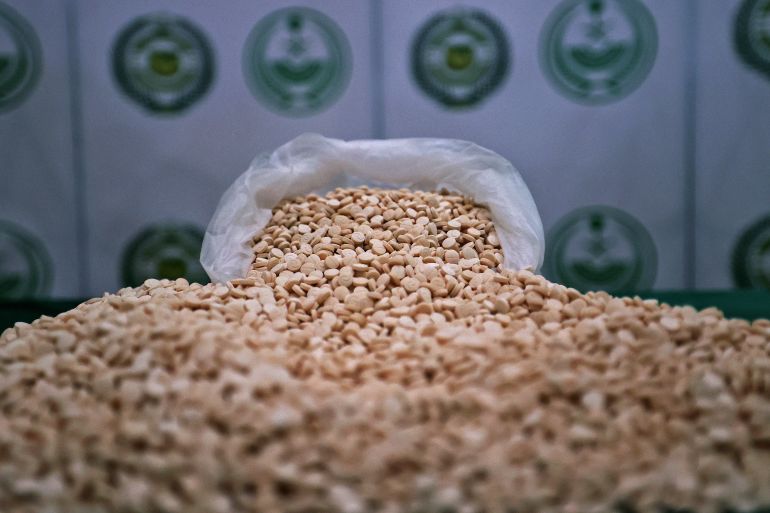Syria seizes hummus bowls made out of crushed Captagon pills
The amphetamine has become one of the most popular drugs in the Middle East, with trade valued at $5.7bn.

Syrian authorities have announced that they have seized 24kg of Captagon that had been crushed and reconstituted to look like hummus bowls.
The amphetamine is produced in pill form but smugglers had crushed it and used the resulting paste to “mould pottery-like dishes coated with a brown adhesive”, the interior ministry said.
Keep reading
list of 3 itemsIraqi police seize more than 6 million Captagon amphetamine pills
Saudi Arabia bans Lebanese produce over drug smuggling
One man was arrested in Damascus and admitted his connection with the thwarted trafficking attempt, the statement said, without specifying where the shipment of fake hummus bowls was bound for.
An investigation into the case is still ongoing, the ministry added.
This video from Syria's interior ministry is wild.
They said a drug trafficker made hummus bowls out of Captagon to transport the drug (they didn't specify where to).
Captagon pills are produced mainly in Syria and smuggled to large consumer markets in the Gulf. pic.twitter.com/JOminXQB4c
— Aya Iskandarani (@Aya_Isk) September 6, 2022
A video shared by the interior ministry’s Facebook page showed dozens of hummus bowls on a floor, with an individual taking one such bowl and peeling the brown adhesive with a knife, revealing the Captagon mould.
Captagon traffickers have in recent years found ever more imaginative places in which to conceal the drug, from fake oranges, to real hollowed-out pomegranates and pitted olives.
They have purposely manufactured various ornamental objects or construction equipment with cavities holding pills, which can only be retrieved at the other end by smashing their handiwork.
By manufacturing objects with the amphetamine powder itself, the traffickers are copying methods used by Latin American drug cartels.
Cocaine in its harder-to-detect liquid form in particular can be used to soak anything from plywood to T-shirts, and retrieved once it reaches its destination.
Captagon was the trade name of a drug initially patented in Germany in the early 1960s. It contained an amphetamine-type stimulant called fenethylline, used to treat attention deficit and narcolepsy, among other conditions.
The drug was later banned and became an illicit substance almost exclusively produced and consumed in the Middle East, and is close to what is known in other countries as “speed”.
Most of global Captagon production originates in Syria, spurring a multibillion-dollar industry that has made the drug the country’s largest export by far.
The Syrian government itself has been accused of being involved in the Captagon trade.
Saudi Arabia is the largest market for Captagon, a versatile drug popular among partygoers but also used for weight loss and by students under academic stress and workers juggling several jobs.
According to an AFP tally, around 250 million Captagon pills were seized worldwide in the first eight months of 2022.
The value of the Captagon retail trade in the Middle East and the Mediterranean was estimated at $5.7bn in 2021, according to the New Lines Institute think-tank.